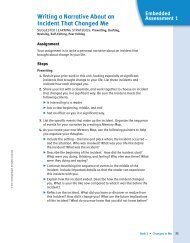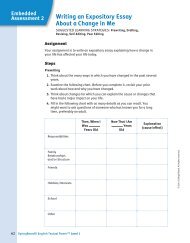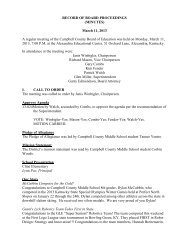December - Campbell County Schools
December - Campbell County Schools
December - Campbell County Schools
You also want an ePaper? Increase the reach of your titles
YUMPU automatically turns print PDFs into web optimized ePapers that Google loves.
GUIDANCE NEWSDECEMBER 2012Volume 1, Issue 5Page 1 of 4GENERAL HOMEWORK TIPS FOR PARENTSWhen your child does homework, you do homework.Show your child that the skills they are learning are related to thingsyou do as an adult. If your child is reading, you read too. If your child isdoing math, balance your checkbook.When your child asks for help, provide guidance, not answers.Giving answers means your child will not learn the material. Too muchhelp teaches your child that when the going gets rough, someone willdo the work for him or her.When the teacher asks that you play a role in homework, do it.Cooperate with the teacher. It shows your child that the school andhome are a team. Follow the directions given by the teacher.If homework is meant to be done by your child alone, stay away.Too much parent involvement can prevent homework from having somepositive effects. Homework is a great way for kids to developindependent, lifelong learning skills.Stay informed.Talk with your child's teacher. Make sure you know the purpose ofhomework and what your child's class rules are.Help your child figure out what is hard homework and what is easyhomework.Have your child do the hard work first. This will mean he will be mostalert when facing the biggest challenges. Easy material will seem to gofast when fatigue begins to set in.Watch your child for signs of failure and frustration.Let your child take a short break if she is having trouble keeping hermind on an assignment.Reward progress in homework.If your child has been successful in homework completion and isworking hard, celebrate that success with a special event (e.g., pizza, awalk, a trip to the park) to reinforce the positive effort.
Page 2 of 4Following InstructionsAccepting CriticismAccepting “No” for an AnswerStaying CalmDisagreeing with OthersAsking for HelpGetting Along with OthersAsking Permission16 Basic Social SkillsApologizingHaving a ConversationGiving ComplimentsAccepting ComplimentsListening to OthersBeing HonestShowing Sensitivity to OthersIntroducing YourselfReiley ElementaryUsing Preventive Teaching to Teach Social SkillsGetting Along With OthersTo be successful in dealing with people, you should:1. Listen to what is being said when another person talks to you.2. Say something positive if you agree with what the person said. If you don’t agree, say something thatwon’t cause an argument. Use a calm voice tone.3. Show interest in what the other person has to say. Try to understand his or her point of view.Reasons for using the skill, Getting Along with Others: It is important to get along with others because you willbe working and dealing with other people all of your life. If you can get along with others, you are more likely tobe successful in whatever you do. Getting along shows sensitivity and respect, and makes it more likely thatother people will behave the same way. In other words, treat others the way you want to be treated!Sometimes it is not easy to get along with others. If someone does something that you do not like, or sayssomething negative, you may feel like behaving the same way. Don’t! Stop yourself from saying things thatcan hurt others’ feelings. Teasing, cursing, and insults will only make matters worse. It is better to ignoreothers’ negative behavior than to act like them.Getting along with others takes some effort. It is hard to understand why some people act the way theydo. Try to put yourself in their place and maybe it will be easier to understand.If you find that you don’t like someone’s behavior, it is better to say nothing rather than somethingnegative.
Page 3 of 4 Reiley ElementaryTEACHING YOUR CHILD SELF-CONTROLReviewed by: W. Douglas Tynan, PhD, ABPPWhen kids melt down in the middle of a crowded store, at a holiday dinner with extended family, or at home, it can beextremely frustrating. But parents can help kids learn self-control and teach them how to respond to situations withoutjust acting on impulse.Teaching self-control skills is one of the most important things that parents can do for their kids because these are someof the most important skills for success later in life.Helping Kids Learn Self-ControlBy learning self-control, kids can make appropriate decisions and respond to stressful situations in ways that can yieldpositive outcomes.For example, if you say that you're not serving ice cream until after dinner, your child may cry, plead, or even scream in thehopes that you will give in. But with self-control, your child can understand that a temper tantrum means you'll take awaythe ice cream for good and that it's wiser to wait patiently.Here are a few suggestions on how to help kids learn to control their behavior:Ages 6 to 9As kids enter school, they're better able to understand the idea of consequences and that they can choose good or badbehavior. It may help your child to imagine a stop sign that must be obeyed and think about a situation before responding.Encourage your child to walk away from a frustrating situation for a few minutes to cool off instead of having anoutburst.Ages 10 to 12Older kids usually better understand their feelings. Encourage them to think about what's causing them to lose controland then analyze it. Explain that sometimes the situations that are upsetting at first don't end up being so awful. Urgekids to take time to think before responding to a situation.When Kids Are Out of ControlAs difficult as it may be, resist the urge to yell when you're disciplining your kids. Instead, be firm and matter of fact.During a child's meltdown, stay calm and explain that yelling, throwing a tantrum, and slamming doors are unacceptablebehaviors that have consequences and say what those consequences are.Your actions will show that tantrums won't get kids the upper hand. For example, if your child gets upset in the grocerystore after you've explained why you won't buy candy, don't give in thus demonstrating that the tantrum was bothunacceptable and ineffective.Also, consider speaking to your child's teachers about classroom settings and appropriate behavioral expectations. Ask ifproblem solving is taught or demonstrated in school.Model good self-control yourself. If you're in an irritating situation and your kids are present, tell them why you'refrustrated and then discuss the potential solutions to the problem. For example, if you've misplaced your keys, instead ofgetting upset, tell your kids the keys are missing and then search for them together. If they don't turn up, take the nextconstructive step (like retracing your steps when you last had the keys in-hand). Show that good emotional control andproblem solving are the ways to deal with a difficult situation.If your child continues to have difficulties with self-control, ask your family doctor if family counseling sessions mighthelp.








